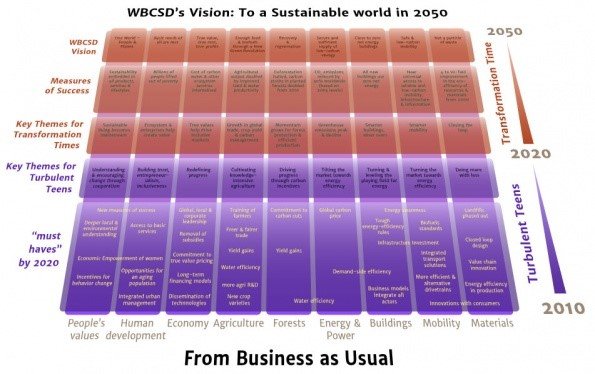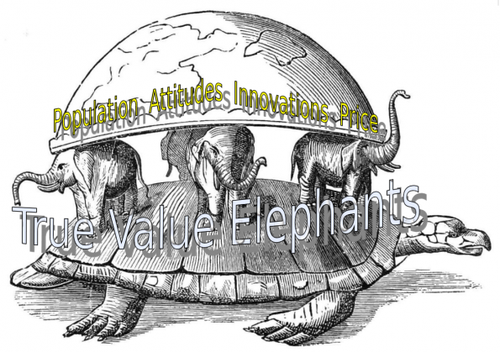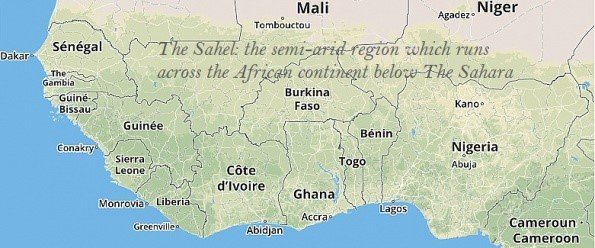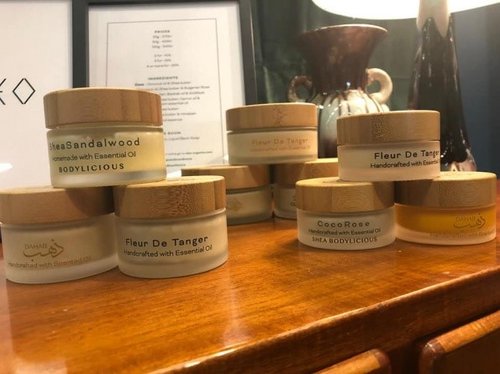Sustainability, Distributed Ledgers, And Shea Butter Pricing
Monday, 06 January 2020By William Kwende & Sarah Jones
True Value Shea Butter Pricing: A 'Must Have' By 2020 Say 200 Of The World's Largest Corporations

This article revisits Vision 2050[i], published in 2010 by some two hundred CEOs of the world's largest corporations of the World Business Council for Sustainable Development (WBCSD). We particularly focus on a Vision 2050 'must have' – true value pricing by 2020, to achieve a sustainable world by 2050. We look at what true value pricing means in practice within current regulatory regimes through the supply chain of West African shea butter, which is used extensively in the cosmetic, food and confectionary industry worldwide.
Dedicated to Stephan Lutter, a colleague and very dear friend at the World Wide Fund for Nature.Stephan very sadly passed away in the lead up to 2020. Stephan has been an inspiration to so many us to continue 'beyond the call of duty' for sustainable development, and never let us forget the beauty of our natural planet.
WBCSD’s vision is of nine billion people living well within the limits of one planet by 2050[ii]. Everyone will be able to satisfy their needs, live ‘a good life’, participate in their community, and better control their fate. Diverse and interdependent countries and cultures will be universally connected and knowledgeable about one another and, in consequence, be more empathetic. Societies will be forward looking, problem solving, resilient, adaptable and experimental in working together in a fast-changing world.
Vision 2050 outlines what must happen along nine paths by 2020 and beyond to achieve a sustainable world by 2050.

Clarity Coalition Secretary General, Sarah Jones, reflects:
By 2010, we were well aware that the responses to the global challenges over the coming decades lacked firm goals and fell woefully short of what was required. We were looking for viable interim steps along the way to focus effort and measure progress. Vision 2050, we felt, made a good start.
We worked with the WBCSD and Long Finance[iii] on Future Business, Long Finance[iv], researching lessons learned from past finance and investment governance, the future of finance, and finance and investment frameworks, strategies and tools, to meet Vision 2050's interim goals. Leading up to 2020, we have particularly focused on a commitment to true value pricing as a 'must have' by 2020 along the Vision 2050 Economy path.

In Future Business, Long Finance, we highlighted the four elephants[v] holding up the sustainable world – population , attitudes, innovations and price.
Population
By 2050 the world will not only have many more people but a far greater percentage of older people. This signifies a decrease in percentage of working tax-paying individuals to finance public essentials such as health, education, infrastructure, security and international aid.
The projections in the transition to 2050 are alarming.
For three decades, figures have started to show a decline in working populations in OECD countries[vi]. In three key European countries, France, Germany and the Netherlands, the working population percentage peaked between 1987 and 1989 at 65.98%, 70.12% and 69.02% respectively. In Spain, Sweden and UK, the working population percentage peaked later between 2005 and 2007 at 68.98%, 68.67% and 66.65% respectively and has steadily declined, mostly year on year since. The largest fall is in Japan, which peaked in 1992 at 69.71% and has since declined by several percent points. The US figure is similar to that of Europe with a peak in 2007 of 67.30% and a decline thereafter.
In a nutshell, the future holds a scenario of inadequate tax payments to meet basic societal infrastructure needs, let alone to shoulder the financing for a transition to renewable resource infrastructure, mitigate and adapt to environmental impact, respond to man-made and natural crises and disasters, support and re-build ecosystem resilience, and contribute to human development, particularly in the least developed countries.
Attitudes And Innovations
There is much to be said about attitudes and innovations. A critical element for all daily wants and needs to contribute to sustainable development overall is the transition to sustainable production. Massive investment in sustainable production worldwide[vii] needs robust, verified data and information for innovators, business strategists, investors, insurers, regulators and consumers. To compete for international investment and/or in international markets, lower-income economies require empowerment at their roots, including robust data collection on production efficiency, quality, environmental, social and governance (ESG) aspects. The investment risk–reward equation can potentially be improved to favour the investee with lower interest rates by keeping the variation in local data to compare range values[viii] with current production practices (Business as Usual).
True Value Pricing - A Response
True value accounting[ix] towards true value pricing involves the data collection, evaluation and incorporation in financial accounts of monitisable and privitisable aspects which contribute to, or are impacted by, economic activity but are not necessarily measured as economic activity. These aspects can include resource data, notably for carbon, water, pollution, waste, people’s income and financial contribution to education and health; and other financial risk assessment data, such as the extent to which an investment bank's risks are costed and covered, or of stranded assets such as potentially unburnable carbon in fossil fuels. These aspects are sometimes referred to as ‘externalities’, that is, they are often external to current financial accounts and the pricing of products and services. Essentially they are measures of sustainable development[x]. If data is available, valuing externalities can run far deeper to as many aspects as required. 'Internalising externalities' in financial accounts and for true value pricing responds to the ever increasing financial demand for improved public services, and risk reduction.
True Value In Practice

Shea butter is used in cosmetic products and in the food and confectionary industry worldwide. It is an important cacao substitute in chocolate. Shea butter is produced from the fruits of the shea tree, which is indigenous to the Sahel in Western and Central Sub-Saharan Africa. Shea butter is called 'women's gold' in Africa for its outstanding properties for healing, for moisturising, as a sun screen, as a food source, and for its income potential. But the current methods of producing shea butter unfortunately involve significant wood consumption, amounting to approximately ten kg of wood per one kg of finished raw shea butter[xi]. To put this into context, around three million people in Burkina Faso alone are involved in the processing of shea butter, from picking fruit to processing or boiling the kernels[xii]. The wood collection to boil water and the shea kernels has serious repercussions on agricultural productivity, biodiversity, climate change and the local people’s respiratory health. Smoke contamination and unhygienic handling of the shea butter means that quality standards for export to many developed countries are not met.
Shea butter is used in cosmetic products and in the food and confectionary industry worldwide. It is an important cacao substitute in chocolate. Shea butter is produced from the fruits of the shea tree, which is indigenous to the Sahel in Western and Central Sub-Saharan Africa. Shea butter is called 'women's gold' in Africa for its outstanding properties for healing, for moisturising, as a sun screen, as a food source, and for its income potential. But the current methods of producing shea butter unfortunately involve significant wood consumption, amounting to approximately ten kg of wood per one kg of finished raw shea butter[xiii]. To put this into context, around three million people in Burkina Faso alone are involved in the processing of shea butter, from picking fruit to processing or boiling the kernels[xiv]. The wood collection to boil water and the shea kernels has serious repercussions on agricultural productivity, biodiversity, climate change and the local people’s respiratory health. Smoke contamination and unhygienic handling of the shea butter means that quality standards for export to many developed countries are not met.

In December 2019 Cleo Organics Europa[xv] launched their cosmetic shea body butter in France and Scandinavia. For the first time in Europe, best quality, pure, organic shea butter is available. which is zero carbon, deforestation free, and has 10% of shares owned by women's groups in West Africa, including for investment in local health and education.
Cleo Organics’ significant achievements to date are because the retail company was designed with true value pricing in mind from grassroots. Golden Organics, the parent company of Cleo Organics Europa, is a major shareholder in the production company Serious Shea[xvi]. Other shareholders are West African women's co-operatives. Serious Shea is collaborating with the Burkina Faso Government to take the shea butter industry forward to the next generation with nationwide eco-centres with cleaner, renewable and water-saving production methods, a hi-tech, exclusive quality control program, and true value data collected daily.
Cleo Organics has been launched in Europe, initially with simple true value data to describe each of the products: 100% pure ingredients; organic; zero carbon; deforestion free; 10% of shares to women's groups; produced without burning firewood with 100% renewable energy; and packaged with 100% recyclable materials (glass jar, engraved label, bamboo lid, recyclable plastic seal).
Golden Organics CEO William Kwende explains:
"Cleo Organics Europa aims to drive forward the true value pricing revolution from the sustainable production level through the supply chain. We already have quantitative financial information on carbon emissions substitution and community returns[i]. We are working on automated true value data variation collection for other aspects such as shea kernel to shea butter conversion efficiency, and daily water use compared to current wood burning practices. We are also quantifying the number of trees that will be planted per product for the restoration of natural parklands and biodiversity, to improve soil quality and to halt desertification."
Z/Yen Group Chairman Michael Mainelli adds:
"We are delighted to assist Cleo Organics Europa to trial an encrypted supply chain data upload to the mutual distributed ledger Metrognomo[xvii]. This blockchain-based technology will add an additional layer of transparency, supply chain security, and legitimacy to verify the robustness of the Cleo Organics Europa true value data in real-time."
With the support of respective governments, Serious Shea is seeking investment for eco-centre expansion in five West and Central African countries. Through UN Climate Change Framework (UNFCCC) verified carbon substitution finance (carbon credits), the Serious Shea investment profile has revalued capital assets to include carbon assets and their ownership, potentially benefiting both impact and mainstream investors. Serious Shea’s supply chain business strategies meet the political risk underwriting requirements of the World Bank’s Multi-lateral Guarantee Agency (MIGA).
Third-party investment aside, William Kwende believes that an alternative investment strategy is that of self-financing. His alternative proposal is to rapidly scale production in line with market opportunities from the Cleo Organics Europa platform. William concludes:
"True value data distinguishes the Cleo Organics products as the best on the market for combined quality, environmental, social and governance reasons. In 2020 we are strengthening our product range and transport logistics to improve customer added-value even further. If we scale up sales rapidly with true value pricing, sustainable production expansion will not require further outside investment."
Simon Jones, Partner at Cognis Capital[xviii], is advising the production company Serious Shea on their investment profile. He comments:
"The carbon market is yet to convince the majority of mainstream investors. Serious Shea has a solid business model without the inclusion of carbon income. As a first stage, Serious Shea will include carbon credits in Profit & Loss projections. A commitment by the World Bank to underwrite political risk is important. Investment in Serious Shea in 2020 is likely to be attractive for impact investors particularly with a scaling of sales of Cleo Organics’ retail products. The success of this first round of financing will open the door to attract mainstream investors for a second round of financing for clean energy shea and super foods production infrastructure across West and Central Africa."
--------------------------------------------------------------------------------------------------
About the Authors
William Kwende is the Founder and Chairman of Agritech Holdings and the CEO of Golden Organics Global. William specialises in sustainable production and supply chain design of agro food products from the farm gate to worldwide markets. In particular his business strategies aim to maximise added-value to local communities in West Africa where he was born.
Sarah Jones is the Co-founder and Secretary General of the Clarity Coalition. Sarah specialises in bridging the gaps between investment and global resource trends, and between the cultures, wants and needs of developed and developing countries.
Both William and Sarah have played leading roles for global sustainable development for over two decades.
Edited by Vikki Cheung
References
[i] The World Business Council for Sustainable Development's Vision 2050, (2010), accessed 29 December 2019.
https://www.wbcsd.org/Overview/About-us/Vision2050 accessed 29 December 2019
[ii] We use the same UN projections for world population but empasise a range of between nine and ten million people. https://www.un.org/development/desa/en/news/population/world-population-prospects-2017.html accessed 30 December 2019
[iii] Long Finance website. https://www.longfinance.net/
[iv] Future Business, Long Finance Presentation to European Environment Agency, Malcolm MacGarvin, Michael Mainelli and Peter Paul van de Wijs (2012). http://claritycoalition.net/wp-content/uploads/2016/06/EEA-FBLF-PP_WBCSD-Signedoff_draft-18Apr12v2-1.pdf
[v] The Four True Value Elephants picture is respectfully adapted by Sarah Jones from a drawing of the World Elephants, Unknown (1876). The names of four elephants supporting the earth from the four directions are given in the Hindu Ramayana: Viroopaaksha (east), Mahaapadma (south), Saumanasa (west), Bhadra (north).
[vi] OECD Working population data. https://data.oecd.org/pop/working-age-population.htm
[vii] For example, Z/Yen Group's Simon Mills quantifies some of the infrastructure needs to respond to Climate Change in Financial Services & Climate Change: More Than Hot Air? (2018), as part of the ongoing research work associated with the Global Green Finance Index. https://www.longfinance.net/news/pamphleteers/financial-services-and-climate-change-more-hot-air/ Also see Clarity’s Knowledge Bank, Why Now and How Much? http://claritycoalition.net/en_GB/knowledge-base/what-is-the-scale-of-investment-transition/
[viii] The Association of Chartered Certified Accountants (ACCA), Long Finance and the Chartered Institute for Securities & Investment (CISI) (2012) propose Confidence Accounting which uses range values to improve the accuracy of financial data analysis and to better assess risk. https://www.longfinance.net/publications/long-finance-reports/confidence-accounting-a-proposal/
[ix] Clarity's preliminary work on Accounting for True Value was first presented at a Longfinance workshop, Malcolm MacGarvin, Sarah Jones and Chiara Von Gunten (2014). http://claritycoalition.net/accounting-for-true-value/
[x] Clarity's Knowledge Bank gives an overview of definitions of sustainability among various sectors (updated 2016). http://claritycoalition.net/en_GB/knowledge-base/what-is-sustainability/
[xi] William Kwende also talks at Hub Culture, Monaco (2019) about True Value transition in the Global Shea Industry.
https://hubculture.com/hubs/861/video/play/2190
[xii] Results of the Agritech Group scoping study for Business as Usual data and information on the West African Shea Industry (2016). http://claritycoalition.net/en_GB/knowledge-base/true-value-cleo-organics-europa/
[xiii] Food and Agriculture Organisation of the United Nations, The impact of the shea nut industry on women’s empowerment in Burkina Faso ,Tammy Chen (2017). http://www.fao.org/3/a-i8062e.pdf
[xiv] Cleo Organics Europa Online Boutique. https://cleo-organics-eu.com/en/
[xv] Serious Shea website. http://seriousshea.com/
[xvi] Cleo Organics Europa True Value. BAU and true value data references and quantification, (2019). http://claritycoalition.net/en_GB/knowledge-base/true-value-cleo-organics-europa/
[xvii] Metrognomo website. https://metrognomo.com/
[xviii] Cognis Capital website http://www.cogniscapital.com/